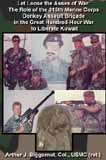On the eve of "G.W.II" in 2003 he followed through on a promise he made to a fellow Marine to raft down the entire length of the Mississippi River together. It turns out he couldn't track down the other guy, so the flashback to his time in the Gulf doesn't lead to the tragedy you expect, in which his friend dies under fire and his dying words are about the journey they planned (but if Hollywood options his book, that is the narrative the suits may impose).
"My River Home" is the book Erikson wrote about his trip. It's a great book in many aspects. A story of growing up admiring war heroes he sees in movies and in his neighborhood and then enlisting to try and realize that fantasy, an honest memoir of learning the hard lesson that the reality doesn't live up to the fantasy, and a great story of how one Marine found some sense of resolution with both his epic journey down Old Man River and his involvement with Veterans for Peace during the run-up to the sequel of his own bit of military history.
One of my favorite passages is his description of the ritual that occurs every time two Marines meet:
"You were in the Marine Corps, huh?" I ask. Stan wears a camouflage cap with the Marine Corps emblem stenciled on it.(Marcus Eriksen, My River Home, at 9.)
"Yup," he says with a smile. When two former marines meet, they typically begin by identifying their unit and years served. They automatically resume a mental program of camaraderie. I particularly enjoy this deep sentiment and ignore the battlefield function of this type of training.
I guess members of other services have comparable exchanges, but because the Marine Corps is the smallest of the branches of the military its members have, I believe, the most in common with each other no matter when they served. Hell, our dress uniforms still look like what John Wayne and his platoon wore on liberty in "The Sands of Iwo Jima", and different Marine units don't deal with all that frou-frou that the Army deals with. Maroon berets? Jeez... But I digress.
Of all the elements in Eriksen's book, my favorite are the stories of the people he meets on the river. After an initial stretch in a canoe, he makes the bulk of the journey on a home-made raft made out of empty soda bottles lashed together. His raft works as an instant conversation starter wherever he ties up for the night and in every little town he inevitably finds an offer of a meal, a place to stay, and/or a ride to the hardware store for supplies to fix his rickety makeshift conveyance.
But after reading this, the librarian in me asks, how do you catalog a book like this? The Loyola's undergraduate library when I was looking up some titles on Louisiana history. I wasn't looking for any memoirs of the first Gulf War, and I had never thought to read about riding a home-made raft down the Mississippi. Thus I became my own perfect example about how browsing the physical stacks at a library led me to a book I otherwise would never have found; sometimes I can be such a "teachable moment" cliche!




No comments:
Post a Comment